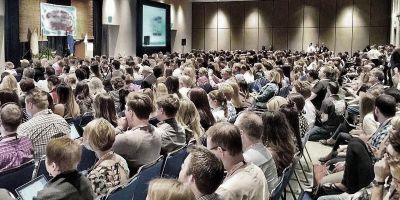Seventh CTS Professionalisation Talk 2017-18
Seventh CTS Professionalisation Talk 2017-18
In the seventh of the Centre for Translation Studies’ popular professionalisation talks, Kirsty spoke to students about her experience as an interpreter for the automotive industry.
On 14 November, the Centre for Translation Studies (CTS) welcomed Kirsty Heimerl-Moggan, a conference and business interpreter working with German and English, and a senior lecturer at the University of Central Lancashire (UCLan).
Kirsty Heimerl-Moggan is senior lecturer in conference interpreting and course leader for the masters programme in interpreting and translation at the University of Central Lancashire in Preston. She is also a practising international conference, business and legal interpreter of over 20 years’ experience, and has worked in a wide variety of settings including international political conferences such as G8 and meetings of the European Union.
Through entertaining anecdotes and insightful practical tips and advice, Kirsty threw light on this important and rewarding area of work. She first spoke of how she got into the automotive industry. Despite not being a fan of cars herself, the wide variety of opportunities available in her language combination led her to jobs in this field. Secondly, she detailed the types of assignment that she usually works on as an interpreter. The more common among these are staff or sales team events, such as car launches and training sessions with staff including paint shop workers, engineers and sales teams. Media events are also common, and whilst they are often very glamorous, they tend to be challenging for interpreters as they require a good deal of preparation. Other events that automotive workers may be required to attend include automotive technicians’ training and race brand events, where they may be required to speak on behalf of industry experts. In these events interpreters tend to move around a lot, and often find themselves in unexpected scenarios for which they may not be fully prepared. For instance, Kirsty once found herself unexpectedly interpreting on the pop artist Andy Warhol at an exhibition at Cadillac House in Munich.
Kirsty also spoke to the students about interpreting assignment preparation. A vital part of the process is reading about the history of the brand she will be representing. She highlighted the importance of staying up-to-date with business news and current affairs, understanding the relationships between companies, arriving at events early in order to set up comfortably and testing equipment. Kirsty also shared a number of useful tips that she wishes she had known before she started automotive interpreting, such as finding out how to get to the restrooms easily, or who should be contacted at an event if any issues arise. She pointed out that being well-prepared from a logistical point of view was essential, as interpreters are often required to visit many different locations throughout the day, and are not always guaranteed transport home at the end of the day. She emphasised the importance of travelling light, with all essentials fitting in a backpack that will leave the interpreter’s hands free to hold their equipment.
In the automotive industry, making sure that clothing choices are practical is a must; interpreters visiting factories will be required to wear personal protective equipment (PPE) including hi-vis jackets and steel toecap boots.
Kirsty shared pictures of attractive venues in which she has worked, beautiful cities she has visited, impressive cars she has seen, and even some photos from her Bentley test drive. It seems that interpreting in the automotive industry is not without its prequisites.




